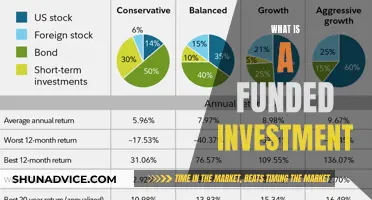
Investing in mutual funds is a popular way to grow your money, but for Muslims, the type of fund they can invest in is limited by Islamic law, or Shariah. Shariah-compliant mutual funds are a type of socially responsible investing that adheres to the moral code of Islam. These funds invest in companies that follow Islamic law and exclude businesses that cause physical, environmental, or emotional harm, such as those involved in the production of weapons, alcohol, tobacco, and gambling. Muslims are also forbidden from investing in companies that earn interest, as this is considered unjust and akin to engaging in war against God. Shariah-compliant funds tend to avoid high-risk investments and require the distribution of wealth through charitable giving. While these funds are designed for Muslim investors, they are open to people of all religions.
| Characteristics | Values |
|---|---|
| Definition | Shariah-compliant mutual funds are a type of socially responsible investing based on the Shariah or Shariat law of the Muslim religion. |
| History | Shariah-compliant funds can be traced back to the mid-1960s when Malaysia and the Middle East came up with the idea of faith-based investments. |
| Who can invest | Shariah-compliant mutual funds are open to all investors of every religion. |
| Prohibited companies | Shariah-compliant mutual funds do not allow investment in companies that cause physical, environmental, or emotional harm. This includes companies involved in the production of weapons, alcohol, tobacco, pork, and gambling. |
| Interest | Muslims cannot take Riba or interest as it is against the moral code of Islam. |
| Companies with high debt | Shariah-compliant mutual funds avoid companies with high levels of debt and forbid investment in fixed-income instruments. |
| Tax treatment | Shariah-compliant mutual funds do not provide any tax benefits to investors and are not considered tax-saving instruments. |
What You'll Learn

Shariah-compliant mutual funds
Features of Shariah-Compliant Mutual Funds
According to Islamic law, Muslims have specific restrictions on the types of funds they can invest in. Shariah-compliant mutual funds allow Muslims to invest within the boundaries of Islamic law. The key features of these funds are:
- Muslims cannot invest in anything that could harm others (physically or emotionally) or harm the environment. They also cannot invest in companies that produce weapons, alcohol, tobacco, pork, or are involved in gambling, pornography, or other non-halal activities.
- Muslims are expected to avoid Riba (interest). The Quran states that those who engage in Riba are waging a war against God. Therefore, Shariah-compliant funds prohibit all forms of interest. Any interest earned is distributed to charity.
- These funds tend to avoid high-risk investments and do not include derivatives and companies with high debt levels.
- Shariah-compliant funds avoid investing in fixed-income instruments.
- Shariah-compliant funds are not restricted to Muslim investors only. Investors of all religions can invest in these funds.
Restrictions According to Shariah Law
To be considered a Shariah-compliant mutual fund, certain rules must be followed:
- Total Debt to Asset Ratio: The fund cannot invest in companies whose total debt is one-fourth or more of their total assets.
- Interest-Free Companies: While finding a company with 100% interest-free income is nearly impossible, Shariah-compliant funds can invest in companies where interest income is up to 3% of total income.
- Prohibited Companies: The fund cannot acquire shares of companies involved in financial services (like banks and insurance companies) or those that manufacture or sell products considered haram in Islam, such as liquor, pork, or tobacco. It also excludes companies involved in gambling, nightclub activities, pornography, etc.
Examples of Shariah-Compliant Mutual Funds
There are currently three Shariah-compliant mutual funds operating in India:
- Tata Ethical Fund: Ideal for investors seeking a diversified equity fund without exposure to the finance and banking sectors.
- Taurus Ethical Fund: Similar to the Tata Ethical Fund, it is suitable for those seeking long-term capital appreciation through investments in Shariah-compliant companies.
- Nippon India ETF Shariah BeEs: This fund aims to generate returns that mirror the Nifty50 Shariah Index by investing in securities listed in that index. It is suitable for investors with a medium to long-term investment horizon.
Settlement Funds: Investing for the Future with Caution
You may want to see also

Halal investing
Halal investment is a way of managing your money and finances in line with the Islamic faith. It is a form of ethical or socially responsible investing that encourages a disciplined investment process, promoting in-depth security research and monitoring.
Islamic Principles
Islamic principles require that investors:
- Share in profit and loss
- Receive no interest (riba)
- Do not invest in a business that is prohibited by Islamic law (sharia)
What to Avoid
Muslims are expected to avoid interest or riba. As per the Quran, anyone who engages in this is considered to have declared war against God. This means that Muslims are not allowed to invest in companies that deal with riba.
Muslims cannot invest in anything that could harm other people (either physically or emotionally) or harm the environment. This includes companies that promote weapons, alcohol, tobacco, pork, gambling, and pornography.
What to Invest In
Halal investment screens help assess whether a company's business activities are halal. These screens seek to eliminate:
- Bonds and other interest-based investments
- Stocks of companies that have high debt
- Securities of companies in industries that do not adhere to Islamic principles, such as liquor, gambling, pornography, pork, insurance, and banks
Benefits and Risks
However, the limitations imposed on investment opportunities by Islamic principles can create risk. Restricting investment choices to a smaller universe means that a halal portfolio may not be as diversified as other portfolios, which may increase the risk of loss.
Who Can Invest?
While Shariah-compliant mutual funds are designed for Muslim investors, they are not only confined to followers of Islam. Investors of every religion are allowed to invest in these funds.
High-Yield Bond Funds: When to Invest and Why
You may want to see also

What businesses are Muslims prohibited from investing in?
Muslims are prohibited from investing in businesses that conflict with Islamic principles. These restrictions are based on Shariah law, which is a moral code of Islam.
Muslims are expected to avoid investing in companies that deal with interest, known as "riba" in Arabic, as well as businesses that could harm people or the environment. This includes companies that generate a significant portion of their income from selling alcohol, tobacco, pork, weapons, gambling, and pornography.
Additionally, Muslims should avoid investing in companies with excessive debt, as well as those involved in short-selling, derivatives, and companies with high levels of risk and uncertainty.
- Alcoholic Beverage Production and Sales: Investing in companies that produce or sell alcoholic beverages is prohibited.
- Defence Industries: According to Shariah law, investing in defence industries or companies involved in the manufacturing of weapons is not allowed.
- Adult Entertainment: Muslims are prohibited from investing in adult entertainment industries, including pornography.
- Interest-based Financial Institutions: Riba, or interest, is forbidden in Islam. Therefore, Muslims should avoid investing in financial institutions that practice interest-based lending or borrowing.
- Conventional Insurance Companies: Muslims are advised against investing in conventional insurance companies that do not comply with Shariah guidelines.
- Non-compliant Tourism and Hospitality: Muslims should only invest in tourism and hospitality businesses that adhere to Islamic principles and guidelines. Hotels, nightclubs, and other hospitality businesses that do not align with Islamic teachings are prohibited.
Corporate Bond Funds: When to Invest for Maximum Returns
You may want to see also

Balanced distribution of wealth
Islam's approach to wealth distribution is comprehensive, complete, and balanced. It is not limited to theological scripture but extends to socio-political and economic principles. These principles are intended to form the basis of frameworks that consider the requirements of the respective time and place. Islam emphasises the voluntary distribution of wealth that is surplus to individual needs. This is the basis of providing a solution to global poverty.
Islam promotes a three-tier structure of priority for the organised circulation of wealth:
- The Household
- The Kinfolk
- Other Members of Society (orphans, widows, the needy, and wayfarers)
Islam encourages wealth distribution beyond the minimum requirement of 2.5% of a Muslim's wealth to be distributed among the needy. It is encouraged that more should be spent from the surplus. Islam correlates the reception of spiritual blessings as a direct consequence of the practical act of wealth distribution, thus promoting the circulation of wealth among over a billion Muslims.
Islam recognises the issue of global poverty and provides practical solutions. It promotes the distribution of wealth beyond the 2.5% requirement to "Spend whatever is in surplus to your needs" so that one is encouraged to take further practical steps that are feasible on an individual basis while also keeping in consideration the needs of the giver.
Islam proposes to distribute wealth in a manner that all those who have taken part in production should receive a reward for their contribution to the creation of wealth, and then all those too should receive their share that Allah has given a right to "wealth".
The Islamic wealth distribution system is based on values such as empathy and generosity. It promises to take care of all the members of an Islamic society. The primary head of the system comprises those involved in production directly: land, labour, and capital owners. The secondary head comprises the segment of society that does not have the means to participate in the production of wealth and does not have enough resources to meet their needs.
Zakat, one of the five fundamental pillars of Islam, has the status of legal alms in the Islamic wealth system. It is a financial obligation that every Muslim who has Nisab threshold wealth must comply with. As wealth circulates in society through zakat, the gap between the rich and the poor narrows down automatically.
Islam's wealth distribution system focuses more on the welfare of the underprivileged section of society. This is achieved through the implementation of Islamic financial policies, such as Islamic banking and welfare programs devised while remaining mindful of moral and social values.
Free Funding: Investment Portfolio Strategies for Savvy Investors
You may want to see also

What are the risks of halal investing?
Halal investing, or investing according to Islamic principles, can be beneficial for Muslims and non-Muslims alike. It encourages a disciplined investment process that promotes in-depth security research and monitoring. However, there are some risks to be aware of.
Limited Investment Opportunities
The limitations imposed by Islamic principles on investment opportunities can create risk. For example, among the securities researched monthly by Saturna Capital for the Amana Funds, less than half pass the initial screens necessary to be considered halal. Restricting investment choices to a smaller universe means that a halal portfolio may not be as diversified as other portfolios, which may increase the risk of loss. Islamic principles may also limit opportunities to gain when prohibited market sectors, such as financial services, rally.
Lack of Income Generation from Cash Reserves
Because Islamic principles preclude the use of interest-paying investments, halal cash reserves cannot be invested in traditional money market funds or deposited in an interest-earning bank account and therefore do not earn income.
High Risk of Gharar (Excessive Risk and Uncertainty)
Halal investors should stay away from investments that come with excessive risk and uncertainty, as these are considered gharar, or deceptive, in Islam. This includes transactions with significant debt, contracts with unclear clauses, selling something you don't own (short-selling), and deferring the payment or delivery of goods to an unspecified future date.
Difficulty in Evaluating Investment Opportunities
Determining whether or not a potential investment opportunity is halal requires due diligence. While identifying haram industries is straightforward, evaluating the financial structure of an investment opportunity can be more challenging, especially in the American financial system, where the concept of interest is embedded.
Lack of Appeal to Non-Muslim Investors
While some non-Muslim investors may be attracted to halal stocks due to their ethical dimensions, others may be put off by the restrictions imposed by Islamic principles, particularly the prohibition on interest.
Valuing Pooled Investment Funds: Strategies for Success
You may want to see also
Frequently asked questions
Shariah investing is the practice of investing in compliance with the set goals and values under Shariah law. This means that investments must be ethically and socially responsible and contribute to the overall development of society, not just benefit the investor.
Shariah law prohibits interest, investing in certain businesses, and uneven distribution of wealth. Investments must avoid companies that earn their income through the sale of alcohol, abusive drugs, pork products, gambling, weapons, and other such products. They must also avoid companies that deal with interest. Finally, Shariah investors must pay a certain percentage of their wealth as charity to purify their wealth.
Shariah-compliant mutual funds are a type of socially responsible investing that follows the rules of Islam. These funds invest in companies that abide by Islamic law.
Shariah-compliant mutual funds offer benefits such as capital appreciation, diversification, and income distribution. They are open to all investors, regardless of religion, and can provide a disciplined investment process that encourages in-depth security research and monitoring.







